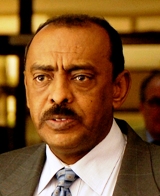Sudan says aid workers should accept government protection
September 25, 2007 (NAIROBI) — With the security situation growing more precarious in Darfur, Sudan’s government is warning U.N. agencies and other aid groups that they should accept offers of military escorts, when they travel through the region.

Sudan Foreign ministry spokesperson, Ali Sadiq Ali, said that aid agencies should accept the government’s offer to escort them around Darfur’s dangerous roads; the Voice of America reported.
“In so many cases, we offered to protect the convoys of the U.N. agencies and international agencies operating in Darfur and this offer has been turned down so many times, because they see that if they accept it this will affect their neutrality,” Ali said. “So it was the NGOs and the U.N. agencies who refused the offer. But, whenever we are asked to render this service we are ready.”
In principle, aid workers decline protection offered by governments or rebel groups in conflict zones to mark their independence and neutrality. They also do so to avoid manipulation by the belligerents.
Oxfam is providing water, public health programs and other services to hundreds of thousands of refugees in Sudan and neighboring Chad. Country Director Caroline Nursey told the Reuters news agency that Oxfam has not withdrawn because so many people depend on it.
Ali said the Khartoum government will do whatever it can to make sure Oxfam does not leave the region.
“We will do our best, our utmost, to prevent Oxfam withdraw from Darfur,” Ali said. “And, we always prefer that any organizations who are attacked to indicate who attacked them, because people might think that, if an NGO did not mention where and when and who attacked it, it might be understood that the government is involved in one way or another, which is not true.”
Since the start of the Darfur conflict in 2003, aid groups have steadfastly refused such offers, because they fear it would tarnish their ability to operate independently and make them a target for attacks.
According to the United Nations, gunmen have hijacked some 100 cars, since January, and dozens of staffers have been taken hostage for a short period.
The conflict has killed some 200,000 people and displaced more than two million others. Aid groups and outsiders had hoped the situation would improve, now the U.N. Security Council has approved a new joint U.N.-African Union peacekeeping force for Darfur. But that action has done little to ease tensions.
(VOA/ST)
